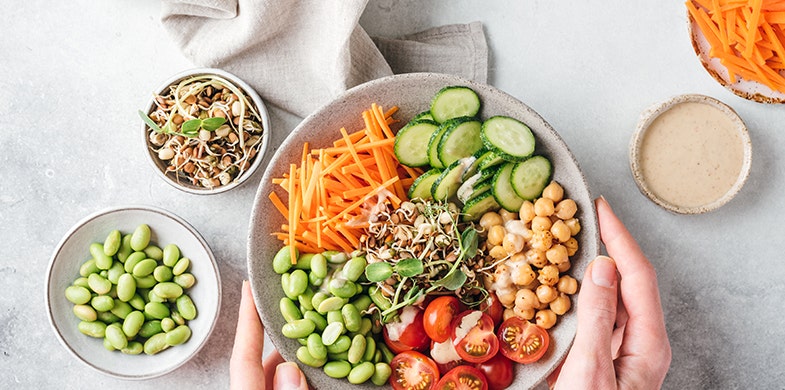Listen to Your Gut – A Guide to Gut Health
- 8/15/22


The importance of having a healthy gut can be difficult to digest. You may rarely notice your gut unless you’re feeling a bit bloated or you have an upset stomach. But your gut deserves your full attention because the health of your gut not only affects how well you feel, but also how well your body functions. A healthy gut is a big deal, which is why it’s surprising that its health comes down to tiny, little bacteria that live inside your gut and make up your gut microbiome. For a better understanding of your gut in all its glory, this helpful digest of facts and finds will give you the full picture, pointers, and products for supporting a healthy gut.
A Gut Check on Gut Health
Before getting to the health of your gut, take a healthy look at it. Your gut is your digestive tract, which includes your mouth, esophagus, stomach, and intestines. Everything you eat moves through your gut to be properly digested. All along this tract await trillions of bacteria that help you break down food and absorb nutrients, some considered “bad,” but with many that are “good” and even essential for good health. The bacteria that live inside your intestines make up your gut microbiome. They may be small in size, but they play a large role in maintaining healthy immune and digestive systems, along with brain and mood health.
Take the Good with the Bad
You want to have a healthy balance of good and bad bacteria for optimal health. The good bacteria absorb nutrients and help your body function at its best, while the bad can lead to many health issues. With a healthy balance, there’s plenty of good bacteria to keep the bad under control. This allows the good to multiply so fast that the bad have no space to grow or go. But when the bad outnumber the good, there’s an unhealthy balance, which can contribute to a full range of health conditions.
Trust Your Gut About Gut Issues
How do you know if you have gut issues? These are the tell-tale signs that your gut is trying to tell you that it’s unbalanced:
-
Digestive discomfort – If you occasionally experience an upset stomach, gas, bloating, constipation, or diarrhea, these tummy troubles may be due to an unhealthy balance of gut bacteria.
-
Endless exhaustion – Tired of being tired? Too much bad bacteria in your gut may be what’s preventing you from getting a good night’s sleep. Your gut produces most of your body’s serotonin, which is the mood-boosting chemical that also affects your sleep.
-
Mood changes – Your gut can mess with your mind. The number of good bacteria in your gut microbiome supports the production and use of serotonin and dopamine, which are your brain’s happy hormones. An unhealthy balance can cause mood swings.
-
Irritating skin issues – Too much bad bacteria in your gut can lead to bad skin. Studies have shown that a lack of good bacteria can cause inflammation in your gut, which can appear as skin irritations.
-
Weighty worries – If you’re gaining or losing weight unintentionally, you may have an unhealthy gut. A gut that’s not balanced can have a hard time absorbing nutrients, signaling a sense of fullness, and storing fat. A healthy gut helps you maintain a healthy weight.
Foods to Feed a Healthy Gut
What’s the recipe for gut health? A diet full of nutrient-rich foods that will tip the balance of good bacteria back in your gut’s favor! See, the amount of good and bad bacteria in your gut is constantly changing because it responds to the foods you eat. By choosing nutrient-packed foods that support the growth of good bacteria, while avoiding the sugary and fatty foods that contribute to bad bacteria growth, you can literally nourish your body’s needs for a healthy balance. What foods support gut health? Some gutsy foods to grow more good bacteria include:
-
Probiotic foods – Fermented foods like yogurt, sauerkraut, kimchi, kombucha, kefir, and tempeh are high in probiotics, which are the same good bacteria you want in your gut for good health.
-
Prebiotic foods – Containing fibers that feed the needs of probiotics, prebiotic foods include bananas, asparagus, Jerusalem artichokes, onions, garlic, and oats.
-
Polyphenols – These natural compounds found in fruits, veggies, legumes, black and green tea, coffee, red wine, and dark chocolate may help protect your cells from damage and promote the growth of good gut bacteria.
-
Leafy greens – Full of nutrients and fiber, leafy greens like kale, spinach, and cabbage contain a special sort of sugar that supports the growth of good bacteria in the gut.
-
Whole grains – Bring on the carbs because whole grains are full of fiber, which your body can’t digest, so instead they get fermented by your gut and increase both its amount and variety of good bacteria.
Pro Tips to Supplement a Healthy Gut
Knowing that good gut bacteria can grow by eating a diet full of nutrient-filled foods, the idea of fitting all of these good-for-your-gut foods into your daily diet can be hard for some to stomach. Luckily, taking a gut health supplement can help. The best supplements for gut health contain special ingredients that support good gut bacteria, as well as increase your immunity and help you get more nutrients from your food. Which supplements support a healthy gut? Go to the pros! This not only means consulting a healthcare specialist, but also going for probiotics, which can help boost the good bacteria in your gut. To choose probiotic supplements for you, look at the label. A good probiotics supplement will:
-
Contain at least one billion live and active bacterial cultures
-
Include bacterial cultures from many different probiotic strains
-
Come from a trusted brand known for high-quality products
-
Be third-party certified for proof of purity and performance
More Good Habits for Gut Health
So you’ve started eating a variety of healthy foods. You’re taking a high-quality probiotics supplement. So far, so good. But what else can you do to support a healthy gut? Look at your lifestyle and adopt these healthy habits to keep the good bacteria in your gut growing and going strong:
-
Get regular physical activity
-
Cut down on stress
-
Get plenty of quality sleep
-
Stop smoking
-
Seek treatment for underlying health problems
If you have a gut feeling that your gut is unbalanced, go with your gut and use these healthy tips to do your gut some good





